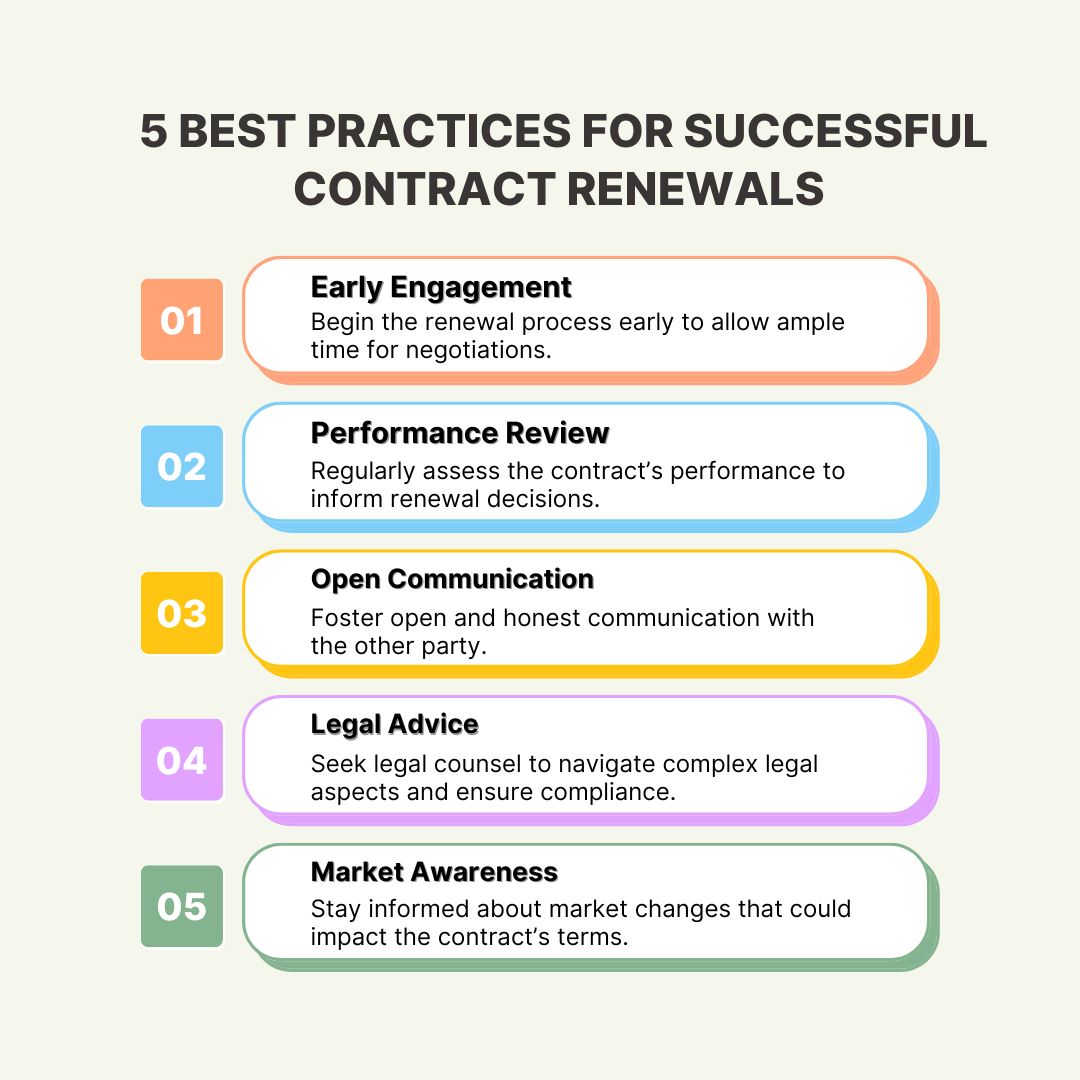Contract renewals are a critical aspect of business relationships. They are the process by which contractual agreements are extended beyond their original terms. Understanding when and how to renew contracts is essential for maintaining continuity, maximizing value, and fostering long-term partnerships. This article explores the intricacies of contract renewals, offering insights into best practices for both businesses and individuals.
What is a contract renewal?
A contract renewal involves the extension of an existing contract’s terms and conditions. This process is common in various agreements, ranging from employment contracts to service agreements and leases. Renewals are important for sustaining ongoing relationships and ensuring stability in business operations.
The Importance of Timing
Timing is crucial in contract renewals. Ideally, the renewal process should start well before the current contract expires. This approach allows sufficient time for negotiations, addressing any changes, and avoiding service interruptions. Early engagement also signals commitment and can strengthen the business relationship.
When to Renew a Contract
- Before Expiration: Renew contracts before they expire to ensure uninterrupted services and maintain negotiated terms.
- Performance Satisfaction: Renew when satisfied with the performance or benefits obtained from the current agreement.
- Changing Needs: Consider renewing when business needs evolve, requiring adjustments in the contract terms.
Also Read: AI-Driven Insights for Optimizing Sales Contract Renewals
How to Approach Contract Renewals?
Review and Evaluation
Start with a thorough review of the existing contract. Evaluate its performance, benefits, and any areas needing improvement. Consider how the business environment or legal requirements might have changed since the contract was signed.
Negotiation Strategies
- Prepare a Proposal: Outline desired changes or continuations in terms and conditions.
- Open Communication: Engage in open dialogue with the other party to understand their perspective and negotiate mutually beneficial terms.
- Flexibility: Be prepared to compromise and find middle ground, especially on non-critical issues.
Legal Considerations
- Statute of Frauds: Ensure that contract renewals comply with the Statute of Frauds, if applicable, especially for agreements that require written evidence.
- Amendments vs. Renewals: Distinguish between an amendment (change in terms) and a renewal (extension of duration). Each has different legal implications.
- Compliance and Regulations: Ensure that the renewed contract complies with current laws and regulations.
Also Read: Leveraging Predictive Analytics in Sales Contract Renewals
Renewal Clauses in Contracts
Many contracts include specific renewal clauses. These clauses detail the process for renewing the contract, including notice periods and terms.
Types of Renewal Clauses
- Automatic Renewal: The contract automatically renews for a specified period unless either party gives notice.
- Negotiated Renewal: Renewal requires active negotiation and agreement from both parties.
- Conditional Renewal: Renewal depends on certain conditions being met, such as performance benchmarks.
Best Practices for Renewal Clauses
- Clear Terms: Ensure clarity in the language of the renewal clause to avoid ambiguity.
- Defined Notice Periods: Specify clear notice periods for informing about renewal intentions.
- Flexibility for Changes: Allow room for negotiating changes in terms during renewal.
Challenges in Contract Renewals
Renewal processes can face challenges, such as misaligned expectations, changes in market conditions, or legal complexities. Address these challenges by maintaining open communication, staying informed about market trends, and seeking legal advice when necessary.
Addressing Changes in Circumstances
Adapt to changing circumstances by renegotiating terms that reflect current realities. This could involve adjusting prices, scopes, or delivery timelines.
Mitigating Risks
Assess potential risks in contract renewals. This includes understanding the implications of new market conditions, changes in laws, or shifts in the other party’s business strategy.
Leveraging Technology in Renewals
Advancements in technology have streamlined the contract renewal process. Utilize contract management software to track expiration dates, set reminders, and store contract versions.

Automated Reminders and Analytics
Use automated systems for reminders about upcoming renewals. Analytics can provide insights into contract performance, aiding in the renewal decision-making process.
Electronic Signatures and Digital Contracts
Embrace digital contracts and electronic signatures to expedite the renewal process, especially in compliance with e-signature laws and the Statute of Frauds.
Best Practices for Successful Renewals
- Early Engagement: Begin the renewal process early to allow ample time for negotiations.
- Performance Review: Regularly assess the contract’s performance to inform renewal decisions.
- Open Communication: Foster open and honest communication with the other party.
- Legal Advice: Seek legal counsel to navigate complex legal aspects and ensure compliance.
- Market Awareness: Stay informed about market changes that could impact the contract’s terms.
Contract renewals are more than mere formalities; they are opportunities to reassess and strengthen business relationships. By approaching renewals proactively, with a clear understanding of when and how to execute them, parties can ensure continuity, adapt to changing circumstances, and maintain mutually beneficial agreements. Whether dealing with employment contracts, service agreements, or leases, the key to successful renewals lies in preparation, communication, and a keen awareness of the legal and market landscapes.
Did you find this Legitt article worthwhile? More engaging blogs about smart contracts on the blockchain, contract management software and electronic signatures can be found in the Legitt Blogs section. You may also contact Legitt to hire the best contract lifecycle management services and solutions.
FAQs on Contract Renewals
What is a contract renewal?
A contract renewal extends the terms and conditions of an existing contract beyond its original end date, maintaining ongoing business relationships and service continuity.
When should you start the contract renewal process?
Begin the process well before the current contract expires, allowing time for thorough review, negotiation, and avoiding service interruptions.
What factors should be considered before renewing a contract?
Consider performance satisfaction, changes in business needs, and market conditions. Evaluate if the current terms still align with your objectives.
How do you negotiate a contract renewal?
Prepare a proposal outlining desired changes, engage in open communication with the other party, and be flexible to find mutually beneficial terms.
What legal aspects are important in contract renewals?
Ensure compliance with the Statute of Frauds if applicable, understand the distinction between amendments and renewals, and ensure the contract adheres to current laws.
What is an automatic renewal clause?
An automatic renewal clause means the contract renews for a specified period unless either party gives notice to terminate or renegotiate.
How can technology aid in contract renewals?
Technology, like contract management software, can track expiration dates, set reminders, and store contract versions for easy access and review.
What challenges might arise during contract renewals?
Challenges include misaligned expectations, changes in market conditions, or legal complexities. Address these through open communication and informed decision-making.
What are the best practices for successful contract renewals?
Start early, regularly review performance, maintain open communication, seek legal advice, and stay aware of market trends to inform renewal decisions.
Can electronic signatures be used for contract renewals?
Yes, electronic signatures and digital contracts are increasingly accepted and can expedite the renewal process, provided they comply with e-signature laws.
